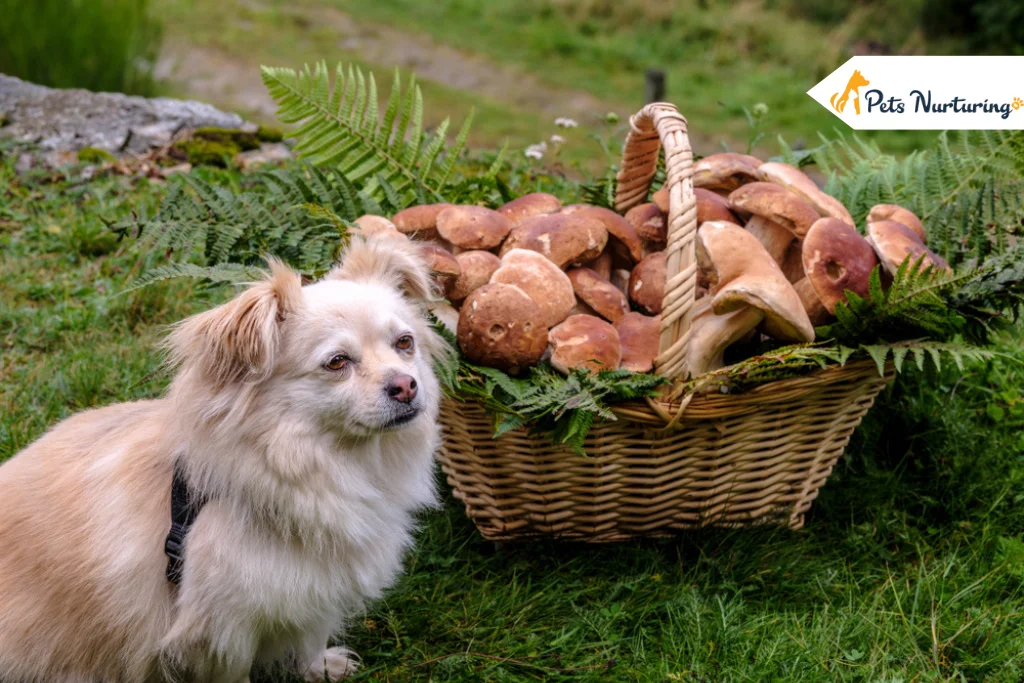
Can dogs eat Mushrooms safely, and which ones might make them sick and require a vet visit?
Mushrooms can make a tasty pizza topping, but for dogs, some mushrooms can be really harmful, even fatal. Are mushrooms safe for dogs? It’s a bit tricky. While some are okay, vets worry that wild mushrooms might cause serious issues for pups, maybe even leading to death. So, which mushrooms are okay for dogs? Even that’s a bit complicated.
To figure it out, let’s explore which mushrooms are safe for dogs, how they can benefit dogs’ health, the right way to give mushrooms to your dog, and whether pet insurance covers mushroom-related issues or special mushrooms meant for dogs.
- Can Dogs Eat Mushrooms for Real?
- Can Puppies Have Mushrooms?
- Can Dogs Consume Wild Mushrooms?
- Are Mushrooms Bad For Dogs?
- Which Mushrooms are Safe for Dogs to Eat?
- How Many Mushrooms Can a Dog Eat?
- What to Do if Your Dog Eats a Wild Mushroom
- Signs of Mushroom Poisoning in Dogs
- Does Pet Insurance Cover Mushroom Poisoning in Dogs?
- Can Dogs Have Mushrooms: How to Safely Feed Mushrooms to Dogs
- Are Mushrooms Good for Dogs?
- Health Benefits of Mushrooms for Dogs
- Safety Tips for Dogs Around Wild Mushrooms
Can Dogs Eat Mushrooms for Real?
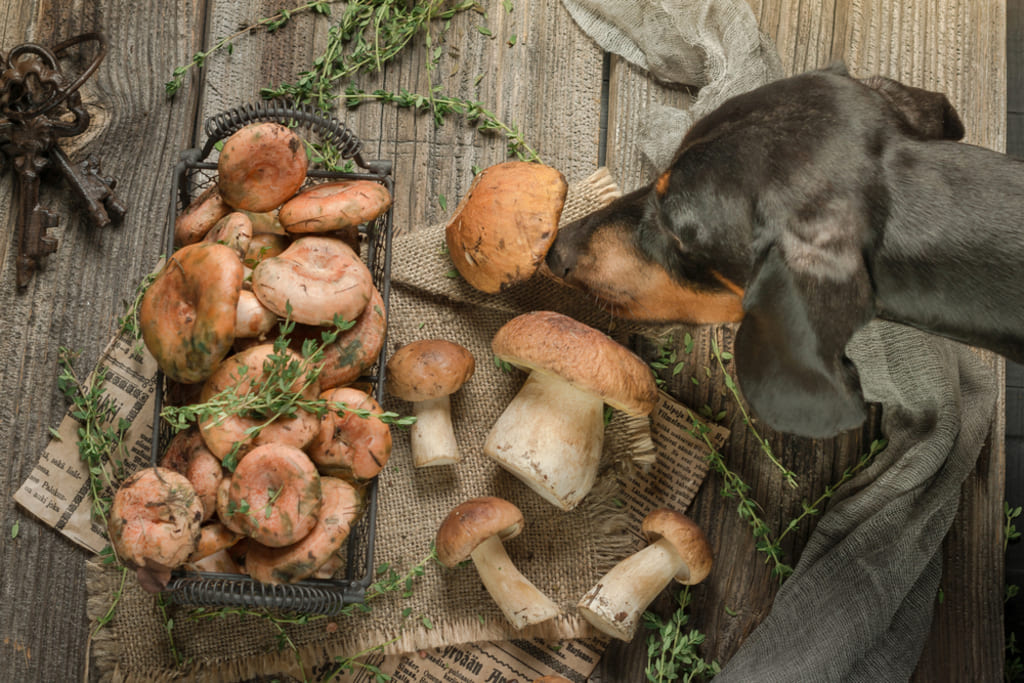
Should dogs snack on mushrooms? Not really. Regular store-bought ones like white button or portabella are safe for dogs when cooked properly, but they don’t offer much useful stuff for dogs.
Wild mushrooms, on the other hand, are risky. They can be poisonous to dogs; even the ‘safe’ ones can cause issues if eaten raw.
“While dogs can munch on cooked store mushrooms, the potential dangers often outweigh the good stuff,” says Dr. Danielle Rutherford, a vet at Westside Veterinary Center in NYC.
But there’s a twist! Some medicinal mushrooms, like shiitake or maitake, could be different. They’re not proven, but they might help boost immunity and fight inflammation in dogs.
Can Puppies Have Mushrooms?
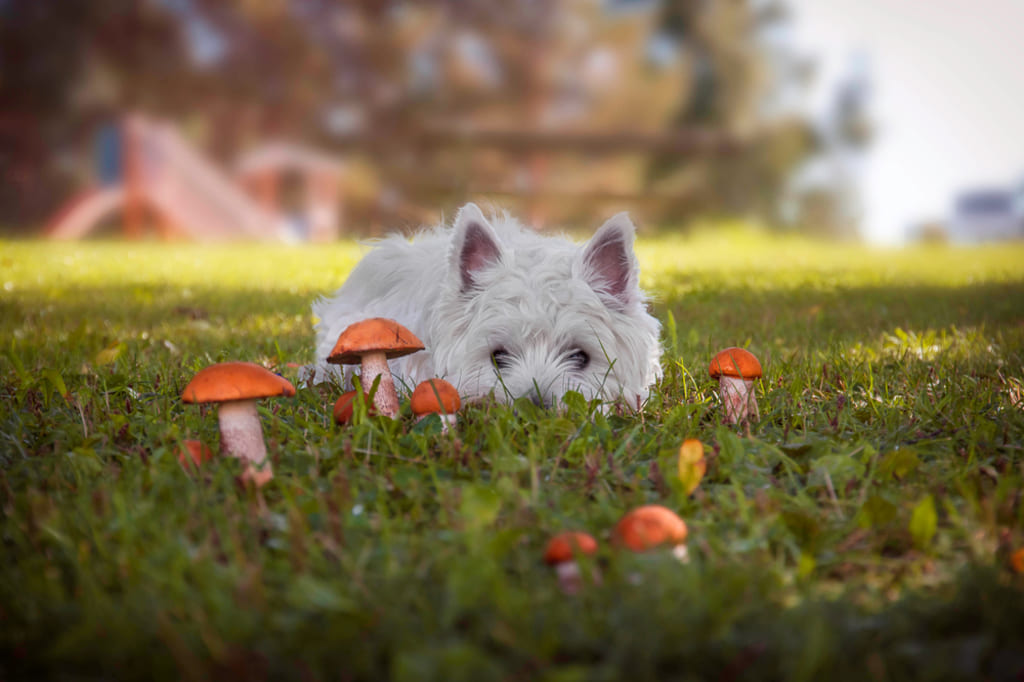
Feeding mushrooms to young puppies can be trickier because of their small size and developing immune systems. Puppies tend to explore the world by chewing on things, making them more prone to gobble up wild mushrooms they find outside.
Offering mushrooms as treats might confuse puppies about what’s safe to eat and what’s not. While it’s usually okay for them to have store-bought mushrooms, unless there’s a specific health need for medicinal mushrooms, there isn’t a strong reason to give mushrooms to your little pup.
Can Dogs Consume Wild Mushrooms?
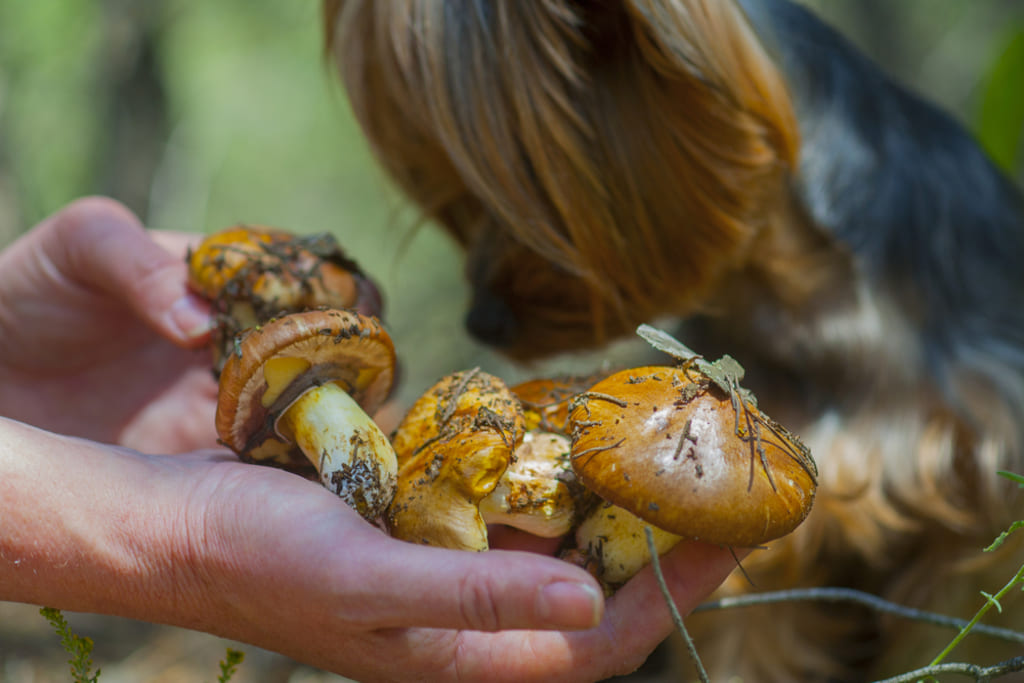
Think this: You’re on a forest track with your pup, and suddenly, they snatch up something from the earth. When you check, it turns out to be a wild mushroom. If your initial response is fear, it’s totally understandable.
Contrary to belief, dogs can’t sniff out toxic mushrooms. That’s why experts think that wild mushrooms might be a common cause of poisoning in dogs. Acting fast is crucial if you suspect your dog ate one.
If your pooch gulps a wild mushroom, don’t wait. Reach out to your vet, an animal poison control authority, or an emergency vet right away for help.
Are Mushrooms Bad For Dogs?
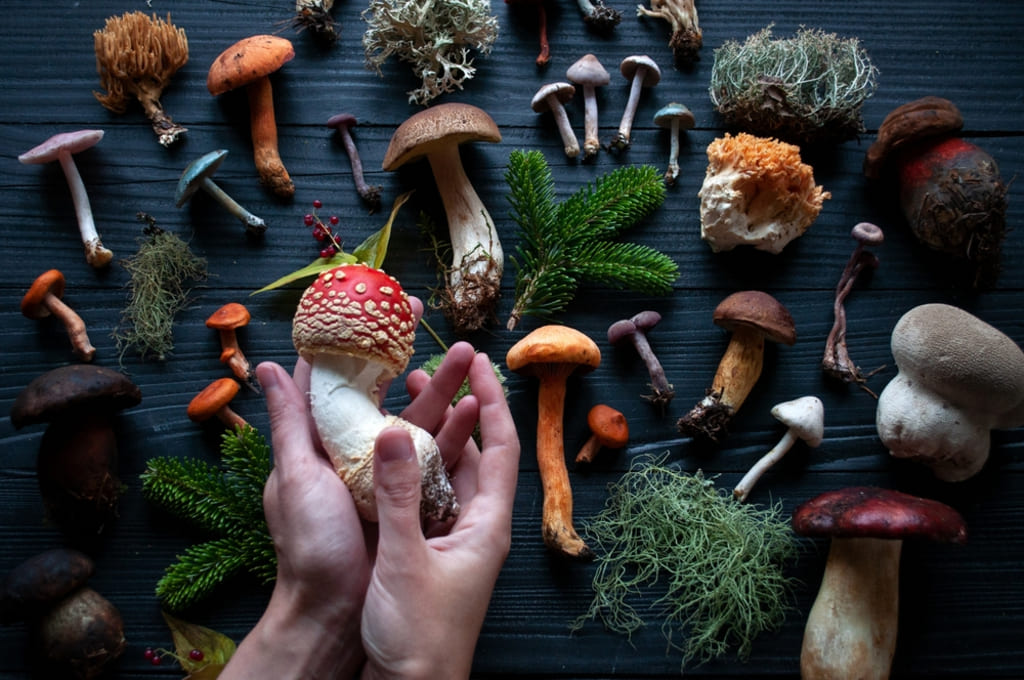
You might have heard the saying, “There are old mushroom hunters, there are bold mushroom hunters, but there are no old, bold, wild mushroom hunters.” It’s because even though only a small number of mushrooms are poisonous, the few that are can be super dangerous. Identifying toxic ones from safe ones is tricky. That’s why vets suggest seeing all wild mushrooms as possibly harmful and treating them like a vet emergency if eaten.
Dogs love to sniff and taste things, and mushrooms might catch their curiosity. Some toxic mushroom types, like the “death cap” or “deadly Galerina,” have a fish-like smell, something dogs are drawn to. That’s why they might end up eating these harmful mushrooms.
Vets advise against attempting to specify the mushroom yourself unless you’re an expert. Even experienced mushroom hunters can make mistakes. If your dog snags a wild mushroom, it’s best to get them to the vet ASAP.
Some wild mushrooms are particularly problematic for dogs, including:
- Amanita gemmate nicknamed the “jeweled death cap.”
- Amanita muscaria is commonly called “fly agaric” or “Deadly Agaric.”
- Amanita phalloides is often referred to as the “death cap.”
- Galerina marginata, called the “deadly Galerina” or “Galerina autumnalis”
- Inocybe spp. and Clitocybe dealbata mushrooms
- Various species of Gyromitra, known as false morels
Which Mushrooms are Safe for Dogs to Eat?
These mushrooms are safe for dogs when they’re cooked without any seasoning:
- Baby Bella
- Cremini
- Porcini
- Portabella
- White button
Also, these medicinal mushrooms are fine for dogs:
- Maitake
- Reishi
- Shiitake
- Turkey tail
How Many Mushrooms Can a Dog Eat?
Dogs can enjoy mushrooms from the store, but it’s important to keep it moderate. Treats, including mushrooms, should only make up about 10% of your dog’s daily food intake. Even safe mushrooms can sometimes upset a dog’s stomach, so it’s a good idea to offer just a few pieces at a time.
Medicinal mushrooms usually come in dried or powdered forms. To give them to your dog, follow the dosage guidance on the packaging based on your dog’s weight. If you’re unsure, your vet can guide you on the appropriate amount for your pup. It’s often best to start with a small dose and adjust as needed.
What to Do if Your Dog Eats a Wild Mushroom
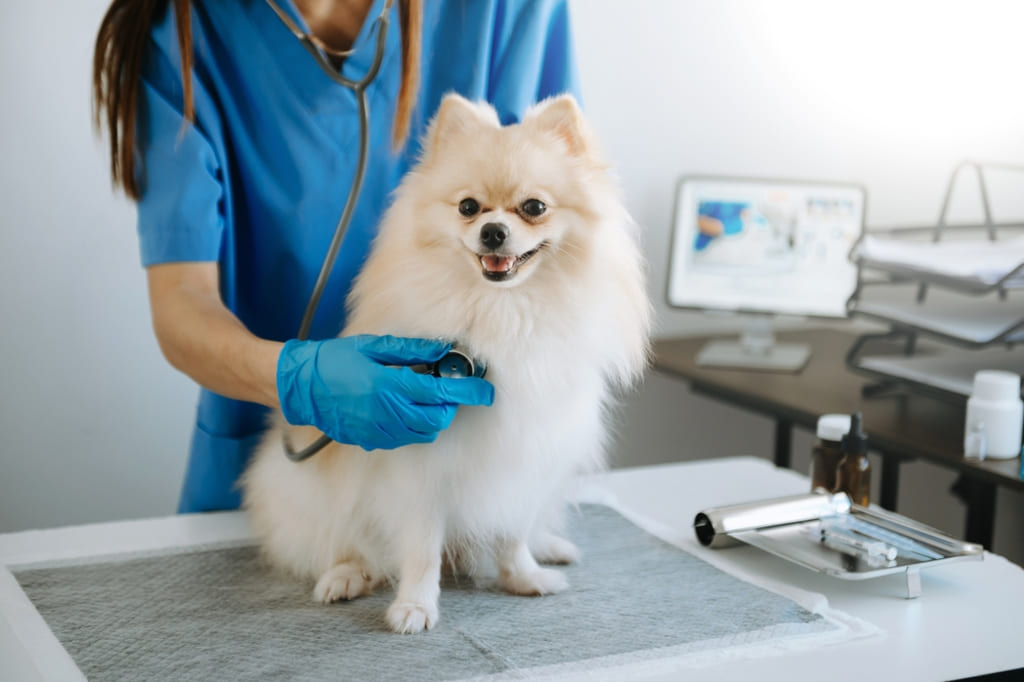
If your dog chews down on a wild mushroom, it’s safest to act fast.
“If your pet gets into a wild mushroom, treat it as an emergency,” advises experts. It’s crucial to contact your vet immediately or rush to an animal emergency room. If you can, bring a specimen of the mushroom along to help the vet identify it and decide the right treatment.
“To decontaminate, inducing vomiting is usually recommended if your pet is stable. Your vet might also give activated charcoal to coat the stomach and stop more toxins from getting absorbed.”
Signs of Mushroom Poisoning in Dogs
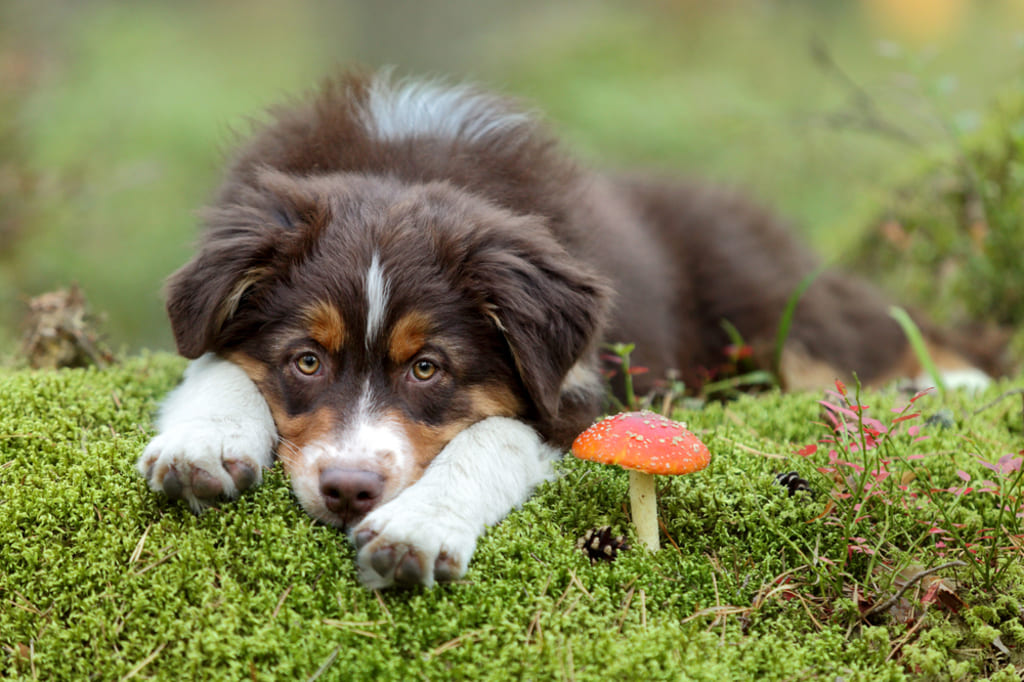
If your dog eats a bad mushroom, the symptoms might show up fast or take a while, depending on the toxin. Look out for these signs and get in touch with your vet right away:
- Drooling too much
- Feeling tired and sluggish
- Having trouble staying balanced or walking
- Seizures or coma
- Skin turning yellow
- Throwing up
- Upset stomach or diarrhea
- Weakness in the muscles
Does Pet Insurance Cover Mushroom Poisoning in Dogs?
Most accident and illness pet insurance plans can help cover the expenses if your dog faces poisoning, including from mushrooms. They might take care of emergency room visits or fees linked to pet poison hotlines.
However, pet insurance usually doesn’t cover herbal remedies or supplements for dogs, including medicinal mushrooms. To know what your policy covers, check the specifics or reach out to your insurance provider for more detailed information.
Can Dogs Have Mushrooms: How to Safely Feed Mushrooms to Dogs
Feeding mushrooms to dogs, even the safe ones, can bring a few concerns:
- Non-organic mushrooms might have pesticides.
- Raw mushrooms contain a compound called monomethyl hydrazine, which could be harmful to dogs.
- Cooked mushrooms made for humans might have unhealthy additives like oils, salt, or garlic.
- The stems and mushrooms themselves can be a choking risk.
To safely feed mushrooms for dogs health:
- Thoroughly wash them to get rid of pesticides and germs.
- Cut them into small, dog-friendly pieces.
- Cook them without oil or butter.
- Serve them plain, without any seasoning.
For medicinal mushrooms, using powdered supplements can be the simplest and safest way. Always consult your vet before introducing new supplements to your dog’s diet.
Are Mushrooms Good for Dogs?
If you can eat it safely, your dog probably can too. But are mushrooms really good for dogs?
Mushrooms are packed with vitamins and nutrients, and some even help fight illness. Here’s the catch: dogs don’t get as much goodness from mushrooms as we do. So, while they won’t likely harm your dog, whether mushrooms are truly helpful depends on your dog’s specific health needs.
Health Benefits of Mushrooms for Dogs
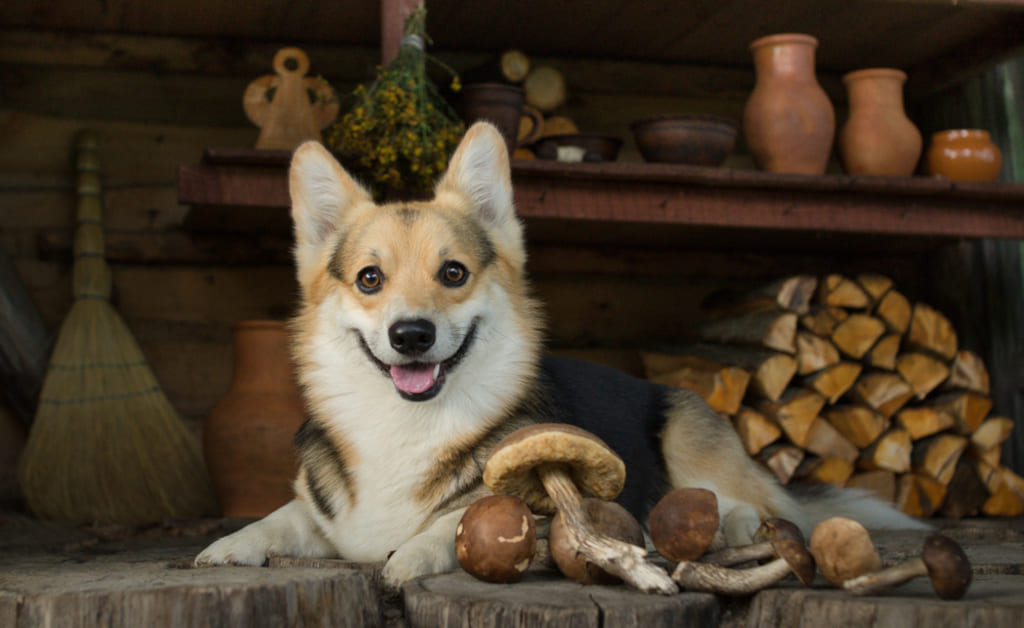
Edible mushrooms carry various vitamins and nutrients such as A, B, C, and D vitamins, iron, magnesium, potassium, copper, selenium, and dietary fiber. However, the real health superheroes for dogs are medicinal mushrooms, offering these benefits:
1. Immune Boost
Certain medicinal mushrooms contain antioxidants and polysaccharides that ramp up the immune system, fighting off diseases, viruses, and bacteria.
2. Gut Health
Some mushrooms, like Cordyceps, are great for treating leaky gut, while polysaccharides in others improve intestinal health and reduce bowel inflammation.
3. Inflammation Relief
These mushrooms have anti-inflammatory properties, easing joint pain and various discomforts and assisting with inflammatory conditions and autoimmune disorders.
4. Heart and Lung Aid
Specific mushrooms like Turkey Tail have been used to manage heart conditions, lower cholesterol, prevent blood clots and improve lung health.
5. Liver and Kidney Support
Different mushrooms like Maitake and Cordyceps can improve liver function, while others assist in managing kidney issues stemming from conditions like diabetes.
6. Allergy Relief
Certain mushrooms like Reishi and Shiitake have antihistamines that alleviate itching and other allergy symptoms in dogs.
7. Blood Sugar Control
Maitake and Reishi mushrooms help reduce blood sugar levels and manage diabetes in dogs.
When choosing mushroom supplements for your dog, it’s crucial to be cautious and consult your vet. Nutritional supplements in the United States aren’t as regulated as prescription medications. “Not all packages contain the listed ingredients,” says experts at Pets Nurturing. “However, vet-recommended products have been used in many cancer patients and are believed to enhance the body’s immune cells.”
Safety Tips for Dogs Around Wild Mushrooms
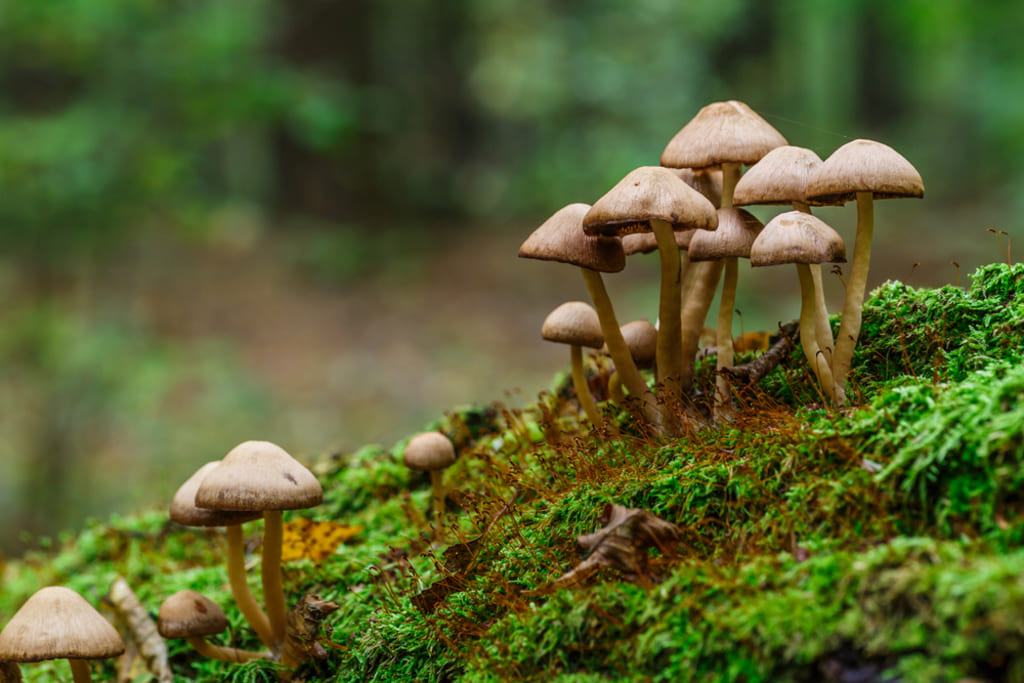
To protect your dog from harmful mushrooms, experts suggest a few helpful steps:
1. Keep your yard mushroom-free
Check your yard often and clear away any mushrooms. Dogs that love exploring might try anything they find, so it’s essential to dog-proof your yard.
2. Watch your dog during walks
Keep an eye out for mushrooms, especially in shady, damp spots during walks or hikes. Having your dog on a leash helps you control what she explores.
3. Know your local mushrooms
Learn about common mushrooms in your area. You can join online mycology groups or contact local experts at colleges, greenhouses, or garden centers to identify safe and dangerous mushrooms.
4. Train your dog to drop things
Teaching your dog the “drop it” command can be a lifesaver, especially if she picks up something potentially harmful, like a wild mushroom.
FAQs
Store-bought mushrooms cooked lightly with a touch of olive oil are all right for your dog. But mushrooms in some dishes may have ingredients like onions, salt, or garlic, which aren’t safe for your furry friend and could cause them to feel unwell.
Store-bought mushrooms such as portabella or white button are usually safe for dogs if you cook them right. Yet, the nutrients in these mushrooms don’t really help dogs much because their bodies can’t absorb them very well.
Yes, certain mushrooms are extremely toxic to dogs and can be life-threatening in certain situations.
Conclusion:
If you wish to feed mushrooms to your dog, you can do so by following our guide. Explore more human foods in our series “Can dogs eat…?” to find out what’s safe and what’s a no-go for your furry friend.
Explore Further:











